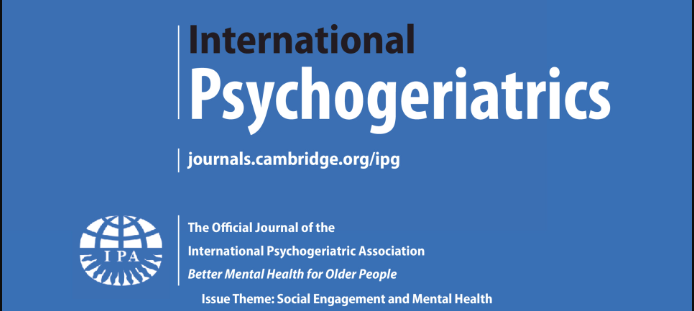FC27: Golden Angels: The impact of volunteer support for patients with dementia and delirium in Australian rural hospitals
IF 4.6
2区 医学
Q1 GERIATRICS & GERONTOLOGY
引用次数: 0
Abstract
Objectives:evaluate the clinical outcomes for acute hospital patients with dementia, delirium or at risk for delirium supported by the person-centred volunteer program in australian rural hospitals.Design:a non-randomised, mixed methods, controlled trial.Participants:older adults admitted to 7 rural acute hospitals. Intervention (n=270) patients were >65 years with a diagnosis of dementia and/or delirium or had risk factors for delirium and received volunteer services. Family carers (n=83) of intervention patients were interviewed. Staff survey and focus groups. Control (n=188) patients were randomly drawn from patients admitted to the same hospital 12 months prior to the volunteer program who would have met program eligibility criteria.Intervention:trained volunteers provided 1:1 person centred care with a focus on nutrition and hydration support, hearing and visual aids, activities, and orientation.Measures:medical record audits provided data on volunteer visits, diagnoses, length of stay (los), behavioural incidents, readmission, specialling, mortality, admission to residential care, falls, pressure ulcers and medication use.Results:across all sites there was a significant reduction in rates of 1:1 specialling (p=.011) and 28 day readmission (p=.006) for patients receiving the volunteer intervention. Los was significantly shorter for the control group (p=.001). All other patient outcomes were equivalent for the intervention and control group (p>.05). Volunteers integrated themselves into the care team providing person-centred care, increased safety and quality of care and were an “extra pair of hands”, reducing care burden for staff and importantly for families: “for me, knowing someone was there … i can't even tell you what a benefit that was”. 98% of staff rated the program as supportive of them in their careEnablers were clear processes for screening, training and supporting volunteers. Key challenges included initial role delineation, staff/volunteer trust and sustainability.Conclusion:appropriately trained and supported volunteers are cost effective and can improve the safety and quality of care for hospitalised patients with cognitive impairment in rural hospitals.FC27:金色天使:志愿者对澳大利亚乡村医院痴呆症和谵妄症患者的影响
目标:评估澳大利亚乡村医院中患有痴呆症、谵妄或有谵妄风险的急症患者在以人为本的志愿者项目支持下的临床疗效。设计:非随机、混合方法对照试验。参与者:7家乡村急症医院的老年人。干预对象(n=270):65岁以上、诊断为痴呆和/或谵妄或有谵妄风险因素并接受志愿者服务的患者。对干预患者的家庭照顾者(人数=83)进行了访谈。员工调查和焦点小组。对照组患者(人数=188)是从志愿者项目实施前 12 个月入住同一家医院、符合项目资格标准的患者中随机抽取的。干预措施:训练有素的志愿者为患者提供 1:1 的以人为本的护理服务,重点是营养和水合支持、听力和视觉辅助设备、活动和引导。衡量标准:医疗记录审计提供了有关志愿者探访、诊断、住院时间(los)、行为事件、再入院、特殊护理、死亡率、入院护理、跌倒、压疮和药物使用的数据。结果:在所有地点,接受志愿者干预的患者的 1:1 特殊护理率(p=.011)和 28 天再入院率(p=.006)显著降低。对照组患者的住院时间明显缩短(p=.001)。干预组和对照组患者的所有其他结果均相同(p>.05)。志愿者将自己融入护理团队,提供以人为本的护理,提高了护理的安全性和质量,是 "多出来的一双手",减轻了工作人员的护理负担,对家属来说也很重要:"对我来说,知道有人在身边......我无法形容这有多大的好处"。98% 的员工认为该计划支持他们的护理工作。主要挑战包括最初的角色划分、员工/志愿者之间的信任以及可持续性。结论:经过适当培训和支持的志愿者具有成本效益,可以提高农村医院认知障碍住院病人的护理安全和质量。
本文章由计算机程序翻译,如有差异,请以英文原文为准。
求助全文
约1分钟内获得全文
求助全文
来源期刊

International psychogeriatrics
医学-精神病学
CiteScore
9.10
自引率
8.60%
发文量
217
审稿时长
3-6 weeks
期刊介绍:
A highly respected, multidisciplinary journal, International Psychogeriatrics publishes high quality original research papers in the field of psychogeriatrics. The journal aims to be the leading peer reviewed journal dealing with all aspects of the mental health of older people throughout the world. Circulated to over 1,000 members of the International Psychogeriatric Association, International Psychogeriatrics also features important editorials, provocative debates, literature reviews, book reviews and letters to the editor.
 求助内容:
求助内容: 应助结果提醒方式:
应助结果提醒方式:


